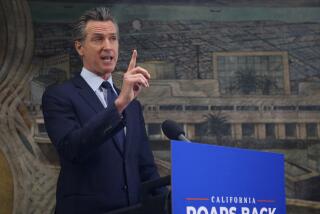A Hasty Patch Won’t Work
- Share via
What the state’s rapidly deteriorating unemployment insurance fund doesn’t need is a patch job by budget-weary legislators. For proof, look at the legislative “fix” Sacramento made during the early 1990s in the workers’ compensation system, setting the stage for its meltdown, well ahead of the unemployment system’s.
The first step is simple, if not easy. California’s congressional delegation must lobby in Washington for a $1.3-billion federal loan. This stopgap is necessary because the troubled fund has tumbled to a balance of less than $500 million from $6 billion in 2002. The slow economic recovery ensures that future obligations will outstrip tax revenue for some time to come.
As with the troubled workers’ compensation system, neither business, which foots much of the unemployment insurance cost, nor out-of-work Californians are getting their money’s worth. The usual suspects -- outright fraud and gaming of the system by workers and employers, along with a bureaucracy that needs improvement -- are partly to blame. The federal government estimates that California’s unemployment insurance system leaks about $250 million a year in fraud and waste.
One of the system’s biggest problems is a “pay as you go” tax schedule that leaves the fund shortchanged in recessionary times. The state needs a formula like the governor’s rainy-day fund, setting aside tax revenue during good economic times so the fund can weather inevitable recessions, when of course demand rises.
California also is one of a handful of states still limiting employers’ unemployment taxes to the first $7,000 of an employee’s taxable earnings; many states set the base at twice that amount. Hard-pressed employers probably will have to pay more but shouldn’t be tagged with the whole cost.
Gov. Gray Davis made things worse in 2001 by signing something-for-nothing legislation that raised benefit payments for the first time since 1989. Though the increases were overdue, the business community was right to warn that bigger checks, in the absence of firmer program controls or new revenue, would lead to insolvency. Scheduled increases in unemployment benefits may have to be delayed until the crisis passes.
As Sacramento tackles this latest predicament, legislators should keep in mind that aside from the moral imperative to help the out-of-work, a federal study shows that each dollar of benefits paid out generates $2.15 in economic activity. Unlike tax cuts for the wealthy, with their slow-acting and less measurable benefits to the economy, unemployment payments are funds well spent.
More to Read
Get the L.A. Times Politics newsletter
Deeply reported insights into legislation, politics and policy from Sacramento, Washington and beyond. In your inbox twice per week.
You may occasionally receive promotional content from the Los Angeles Times.










